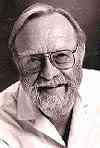

|
A selection from:
Love, Sex and PSA
by Robert Hitchcox
Emotions
(pages 57-59)
Many years ago the late Lenny Bruce had a nightclub routine
about the emotions we experience during stress: denial, anger,
bargaining, depression, and, finally, acceptance. At some point
in our bout with prostate cancer (PCa) we generally feel these
emotions. Oh, we mask them in a macho front or, like me, in
humor; we do tend to hide these feelings. But just between you
and me, we still feel them. Let's take a look at each from a PCa
patient's view point.
Denial
Our first denial came a long time ago when we said, "I'm too
young to have prostate cancer. That's an old man's disease."
Bull pucky! Give me your definition of old. I think old probably
begins in the eighty-fifth year. Our life and death "hobby" strikes
many young men. I read of PCa striking a 38-year-old. At age
forty it would pay to have a PSA, earlier if you've had any
problems down there or your father or brother had PCa.
We deny the existence of cancer. Boy, that does us a lot of
good! How many of those 41,800 annual prostate cancer deaths
were indirectly caused by denial?
So, in a word, denial kills.
Anger
Remember when you read "The Phone Call." I was angry!
Why me? I thought. I'm only 35 in a 61-year-old body. I can't
have cancer. Bull crap! I kept that anger until I got drunk. The
next day the major anger was gone -- I had work to do. Oh, I
won't kid you, there is still residual anger. However, since anger
is counterproductive, it is best to channel it into positive emotions
such as hope, constant positive attitudes, and humor. You know,
all the emotions a good shrink would tell you to use. Just pick up
a self-help book, there are hundreds of them.
Bargaining
Lenny Bruce's routine was a classic. Think about it for a
moment. Don't you think it is a wee bit too late to try and talk
your way out of our disease?
Depression
Oh, this is a tough one. I've run the gamut of emotions. Every
time I think I've surmounted my depression, it sneaks up on me.
Then, of course, I deny it. The following scenario took place at a
friend's home two months after my surgery.
Victoria looked at me, "Hitch, you look really depressed today."
"Naw, just tired."
"Are you sure? It looks like more than 'just tired'."
"Honest, Vicki, just tired."
I know that the minute I left she turned to her partner saying,
"Donny, Hitch is really down today. I think we should check on
him tomorrow." And, of course, she was right.
Depression is rather insidious. It comes uninvited, seemingly
without motivation. It has to be the worst of the emotions to
conquer, but conquer we must. When it comes, if you can, try to
analyze it to determine its source. My most recent bout probably
stemmed from two sources. One, the PSA tests were still causing
consternation, and, two, we were starting on the chemistry to get
the old donicker back into its former mode of operation. Both of
these anticipations are bothering me.
Okay, now that I know what caused my depression, I can
handle it better. Not great, just better. I may not be able to
conquer the depression, but knowing the cause gives me an
understanding, which eases the depression greatly.
Acceptance
If only it was simple to follow the rule:
Please help me change the things I can change
and accept the things I can't change
We cannot change the fact that we have prostate cancer, but
there are many paths we can take once we accept this fact. That
is, in part, what this small book is all about -- acceptance. While
we can't change the facts, we can do a lot about them.
We may be stuck with incontinence. Our next step is to live
with it, research the physical and mechanical controls, and make
the necessary changes to ensure an acceptable quality of life.
We may be stuck with impotence. Our next step is to live with
it, research the medical and mechanical alternatives, and make
the necessary changes to ensure an acceptable quality of life.
We may be stuck with post-treatment prostate cancer. Our
next step is to live with it, research our next step, and make the
necessary changes to ensure an acceptable quality of life.
Am I repeating myself? Yes! Accepting our condition and acting
upon it is the only rational alternative. To sit back and say, "Alas,
woe is me!" just doesn't hack it! We don't want to deny our partner
that relationship we've had for years. We adjust, make changes,
simply because we have accepted our circumstances and have
gotten on with our lives. End of preaching, let's learn about driving.
|
|